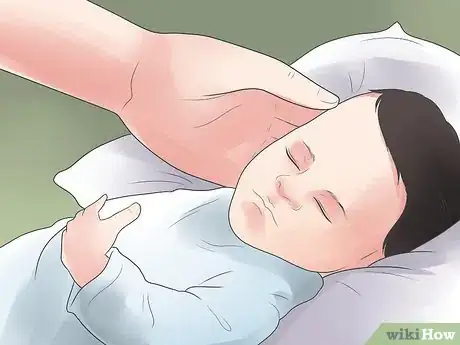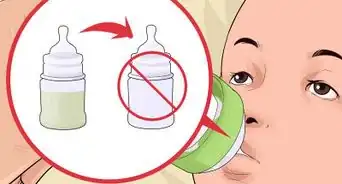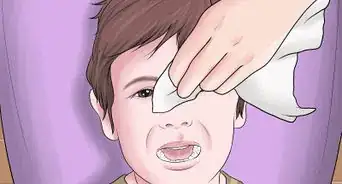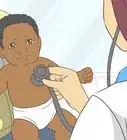This article was co-authored by Julie Wright, MFT. Julie Wright is a Marriage and Family Therapist and the co-founder of The Happy Sleeper, which offers sleep consulting and online baby sleep classes. Julie is a licensed psychotherapist specializing in babies, children, and their parents, and the co-author of two best selling parenting books (The Happy Sleeper and Now Say This) published by Penguin Random House. She created the popular Wright Mommy, Daddy and Me program in Los Angeles, California, which provides support and learning for new parents. Julie's work has been mentioned in The New York Times, The Washington Post, and NPR. Julie received her training at the Cedars Sinai Early Childhood Center.
This article has been viewed 64,678 times.
Children tend to develop ear infections more often than adults do. Unfortunately, if your child is not old enough, he or she may have a hard time expressing the pain he or she is feeling. When you do determine that your child has an ear infection, call your doctor so that you can start treating the condition. While the medicine does its job, you may find that putting your child to sleep while he or she can still feel the pain may be very challenging. When faced with a sleepy child in pain, try to make your child as comfortable as possible, and do everything you can to soothe him or her at bedtime.[1]
Steps
Making Your Child Comfortable
-
1Help your child get into a comfortable position. Ear infections can make it hard to lie down and sleep.[2] A baby with an ear infection may be more comfortable being held. She may need to be propped up on a pillow or have a wedge placed under her crib mattress so that she is not lying down in a completely flat position.[3]
- If your child’s ears have fluid in them from the infection, then lying flat on her back will cause pressure that feels like all the air has just been sucked out of the room. Propping your child up will help the Eustachian tubes in her ears to clear out, and it will relieve some of the pressure.
-
2Give your child something to drink to clear the fluid from her ears. Ear infections may cause pain and/or discomfort when eating or drinking so it may sound strange to recommend giving your child a drink. However, drinking a few sips of water or juice can help to stimulate the muscles in and near the Eustachian tubes in your child’s ears.[4]
- When these muscles are stimulated, they can clear the fluid out of your child’s ears more efficiently. That means that the tubes in your child’s ears can open and begin to clear; this will help to reduce your child’s pain and allow her to sleep more soundly.
Advertisement -
3Limit the amount of dairy your child consumes. If at all possible, try to limit the amount of milk and dairy that your baby consumes when she has an ear infection. Dairy products increase the mucus in your child’s body and make it hard for the tubes to drain fluids away effectively.
-
4Get a prescription for your child. When you notice that your child is in pain, contact your pediatrician right away. He or she will be able to diagnose the ear infection and prescribe medication that will help your child to overcome the infection. Your pediatrician will most likely prescribe antibiotics, and possibly some pain medication. Follow the doctor’s orders when giving your child the medication.[5]
- Trust your instincts when it comes to bringing your child to the doctor. Because children have a hard time expressing what they are feeling, it is up to you to figure out when your child needs a doctor. Trust your instincts; if your baby does not look or act as if she feels well, you should consider taking her to the doctor.
-
5Understand that some medications will make your child sleepy. Many times, pain relievers will relax your child so that she will fall asleep. Sometimes the pain relievers will have something in them that may even help your child to become sleepy.
- If this is the case, your baby may be sleepy for a couple of days as the medication works its way through her system.
Soothing Your Child
-
1Hold your child and let her know that you are here for her. When a baby has an ear infection, she may become confused by the pain and therefore become scared. If your baby is restless or nervous, swaddle her in a soft cloth and hold her close to you.[6]
- Use a gentle voice to soothe your baby and let her know that you are right there. This may help her to relax.
-
2Distract your child with a story or song when you put her into bed. When you are trying to put your child to sleep, she will probably begin to feel her ear pain even more intensely. To combat this, try telling your child a story, or singing her several songs while she falls asleep.[7]
- Distracting her while also soothing her may help her to fall asleep despite the pain she is feeling.
-
3Try rocking your child but stop if she complains. While rocking can generally help a baby fall asleep, the back-and-forth movement may not help a child with an ear infection. This is because that rocking movement can move the fluid in your child’s ears around, causing pain.[8]
- Follow your baby’s lead; if she seems fine being rocked, then continue to rock her until she doesn’t want to be rocked anymore.
-
4Remain calm when trying to put your baby to sleep. If you are stressed out by your child’s pain, your child will sense your stress and will most likely find it more difficult to fall asleep. Try to show your child that you are calm and that you know everything will be ok.[9]
- When you calm and positive, your child will most likely feel reassured, despite the pain in her ear.
References
- ↑ https://www.hopkinsmedicine.org/health/conditions-and-diseases/ear-infections-in-babies-and-toddlers
- ↑ Julie Wright, MFT. Parenting & Baby Sleep Specialist. Expert Interview. 6 March 2020.
- ↑ https://health.clevelandclinic.org/3-home-remedies-for-an-ear-infection/
- ↑ https://kidshealth.org/en/parents/flying-ears.html
- ↑ https://www.hopkinsmedicine.org/health/conditions-and-diseases/ear-infections-in-babies-and-toddlers
- ↑ https://www.healthychildren.org/English/ages-stages/baby/crying-colic/Pages/Calming-A-Fussy-Baby.aspx
- ↑ https://www.nhs.uk/conditions/baby/caring-for-a-newborn/soothing-a-crying-baby/
- ↑ https://www.healthychildren.org/English/ages-stages/baby/crying-colic/Pages/Calming-A-Fussy-Baby.aspx
- ↑ https://www.healthychildren.org/English/ages-stages/baby/crying-colic/Pages/Calming-A-Fussy-Baby.aspx






































































Medical Disclaimer
The content of this article is not intended to be a substitute for professional medical advice, examination, diagnosis, or treatment. You should always contact your doctor or other qualified healthcare professional before starting, changing, or stopping any kind of health treatment.
Read More...